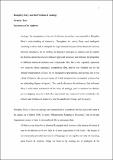Files in this item
Humphry Davy and the problem of analogy
Item metadata
| dc.contributor.author | Tate, Gregory Paul | |
| dc.date.accessioned | 2020-05-21T23:36:00Z | |
| dc.date.available | 2020-05-21T23:36:00Z | |
| dc.date.issued | 2019-07-01 | |
| dc.identifier | 257022573 | |
| dc.identifier | 2bfbe56f-4e9c-4361-883c-bccfefee8e6a | |
| dc.identifier | 85066840136 | |
| dc.identifier | 000474726500004 | |
| dc.identifier.citation | Tate , G P 2019 , ' Humphry Davy and the problem of analogy ' , Ambix: The Journal of the Society for the History of Alchemy and Chemistry , vol. 66 , no. 2-3 , pp. 140-157 . https://doi.org/10.1080/00026980.2019.1616944 | en |
| dc.identifier.issn | 0002-6980 | |
| dc.identifier.other | ORCID: /0000-0002-5930-8187/work/60631337 | |
| dc.identifier.uri | https://hdl.handle.net/10023/19981 | |
| dc.description | This article forms part of a larger project, titled “Poetical Matter” and partly funded by a British Academy Mid-Career Fellowship, which examines the exchange of methods, theories, and language between poetry and the physical sciences in the nineteenth century | en |
| dc.description.abstract | Analogy, the comparison of one set of relations to another, was essential to Humphry Davy’s understanding of chemistry. Throughout his career, Davy used analogical reasoning to direct and to interpret his experimental analyses of the chemical reactions between substances. In his writing, he deployed analogies to organise and to explain his theories about the relations between physical processes and between the properties of different chemical elements and compounds. But Davy also regularly expressed two concerns about analogical comparison: first, that it was founded not on the rational interpretation of facts but on imaginative speculation; and second, that it was a kind of rhetoric, the persuasiveness of which depended not on material evidence but on misleading figures of speech. This article discusses the influences that informed Davy’s ambivalent assessment of the value of analogy, and it examines the distinct yet overlapping ways in which this assessment was expressed in his notebooks, his lectures and treatises on chemistry, his philosophical writings, and his poetry. | |
| dc.format.extent | 18 | |
| dc.format.extent | 231813 | |
| dc.language.iso | eng | |
| dc.relation.ispartof | Ambix: The Journal of the Society for the History of Alchemy and Chemistry | en |
| dc.subject | Humphry Davy | en |
| dc.subject | Chemistry | en |
| dc.subject | Poetry | en |
| dc.subject | Analogy | en |
| dc.subject | Romanticism | en |
| dc.subject | Q Science (General) | en |
| dc.subject | D History (General) | en |
| dc.subject | T-NDAS | en |
| dc.subject.lcc | Q1 | en |
| dc.subject.lcc | D1 | en |
| dc.title | Humphry Davy and the problem of analogy | en |
| dc.type | Journal article | en |
| dc.contributor.sponsor | The British Academy | en |
| dc.contributor.institution | University of St Andrews. School of English | en |
| dc.identifier.doi | 10.1080/00026980.2019.1616944 | |
| dc.description.status | Peer reviewed | en |
| dc.date.embargoedUntil | 2020-05-22 | |
| dc.identifier.grantnumber | MD160047 | en |
This item appears in the following Collection(s)
Items in the St Andrews Research Repository are protected by copyright, with all rights reserved, unless otherwise indicated.

